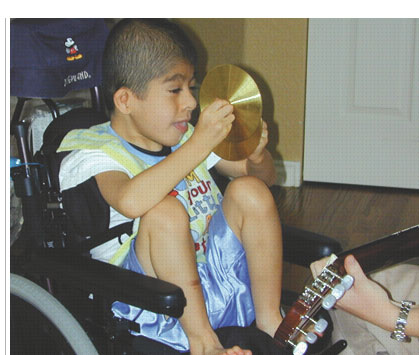
Individuals with Multiple Disabilities
A music therapist implements structured music experiences to help individuals with multiple disabilities meet therapeutic and educational goals. Parents and teachers report that music is one of the few interventions that a student with multiple disabilities responds to consistently. Music provides a useful and motivating way to allow for the necessary repetition for learning to occur.
Some common goal areas for individuals with multiple disabilities include visual and tactile stimulation, language development, academic skills, and social skills. Specialized techniques can facilitate gross and fine motor skills as well. Individualized music therapy interventions are utilized to address these areas of need.
Click here for a free consultation on how music therapy can help persons with multiple disabilities.
Adults with Developmental Disabilities
Music therapy is used to improve social interaction, communication, pre-academic skills (i.e. attention span, following directions, eye contact), sensory stimulation, and gross and fine motor skills. Music therapists can address these needs by providing structured musical interventions that allow for a positive and successful experience. Adults with developmental disabilities can be seen on an individual basis or as part of a group experience. Some individuals participate in “adaptive” music lessons such as learning the guitar or piano. The music therapist structures the lessons to meet the cognitive and physical needs of the client.
Click here for a free consultation on how music therapy can help persons with developmental disabilities.
Music Therapy for Individuals with Emotional or Behavioral Disorders
The goals of music therapy with emotional and behavior disorders focuses on emotional, physical, cognitive and social growth. Music therapy interventions can target long-term goals and short-term objectives to accomplish individualized needs. Individuals are encouraged to explore and express their feelings, values, ideas and opinions in the context of a non-threatening environment.
Click here for a free consultation on how music therapy can help persons with emotional or behavioral disorders.
Special Needs Infants and Toddlers
Music therapy is a wonderful way to encourage development and learning in infants and toddlers. Music stimulates all of the senses and involves the child at many levels. Quality learning and participation occurs because music is highly motivating.
Click here for a free consultation on how music therapy can help as an early intervention.
Neurologic Music Therapy
Neurologic music therapy is the therapeutic application of music to cognitive, sensory and motor dysfunction due to neurologic disease of the human nervous system. Neurologic music therapists have additional training in neuroanatomy/physiology, brain malfunctions, medical terminology and rehabilitation of cognitive and/or motor functions. Neurologic music therapists have completed an extensive training course through the Center for Biomedical Research in Music at Colorado State University. In addition, NMT’s must further their education with Fellowship training every 2 years.
Neurologic Music Therapy (NMT) interventions are applicable to many populations including, but not limited to:
- Stroke
- Parkinson's Disease
- Alzheimer's Disease
- Traumatic Brain Injury
- Cerebral Palsy
- Autism
Click here for a free consultation on how neurologic music therapy can help.
Hospice
"The last days of living should not be seen as defeat but as life’s fulfillment. It is not merely a time of negotiation, but an opportunity for positive achievement. One of the ways we can help our patients most is to believe and expect this.” - Cicely Saunders, Hospice Founder
Click here for a free consultation on how music therapy can be implemented for the hospice patient.
Music Therapy Provides:
- Memory recall
- Awareness of self and environment
- Decrease in agitation
- Increase in positive mood
- Stress reduction
- Life reflection
- Social interaction
- Non-verbal communication
- Spiritual support
- Improve quality of life
Music Therapy Involves:
- Assessing clients’ needs
- Interactive session that may involve singing, song writing, reminiscence, and music-facilitated relaxation, etc. with the patient and/or family. Therapist can assist in planning and providing music for memorial service
- Providing a positive, pleasant environment for the entire unit
Patient and Family Quotes:
Though Naomi’s voice was failing as she aged, she reminded us that, “God hears the voice of the spirit.” -patient
“It was wonderful to hear her talk about her past and it really helped her relax. She became more alert.”-patient’s family
“My mom has always loved music. This was a special pleasure at a difficult time. Many thanks! I would recommend music therapy for others and rate it high on a scale from 1-10!” -patient’s daughter
Music and Wellness
The systematic use of music to address the health of the whole person.
Music and Wellness Includes:
- Group drumming
- Therapeutic singing
- Vocal improvisation
- Music-facilitated relaxation
- Movement to music
- Song writing
Music and Fitness Includes:
- Therapeutic Instrumental Music Performance—Play instruments in fun and creative ways to address endurance, range of motion, etc..
- Patterned Sensory Enhancement—Use live music to facilitate stretches and exercises at YOUR pace and ability level.
- Creative Movement to Music—Therapist guides group members in creative dance and other forms of physical expression to music.
Necessary Equipment:
- NONE! We bring all of our own music, supplies, and instruments. However, we encourage all participants to bring their own and share their ideas if they so desire.
Click here for a free consultation on how music therapy fits into your Wellness Program.

